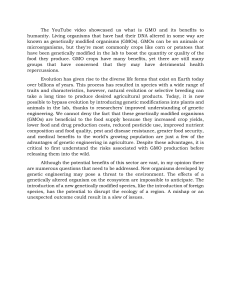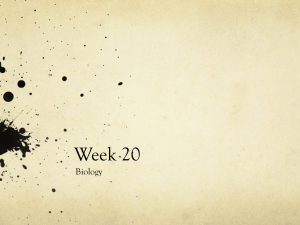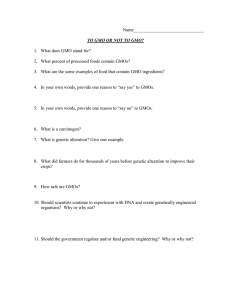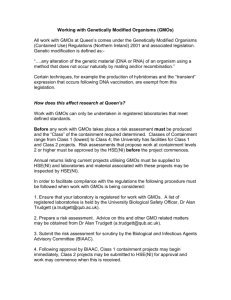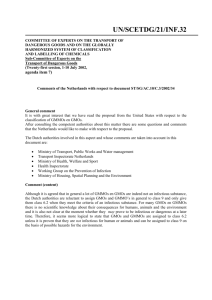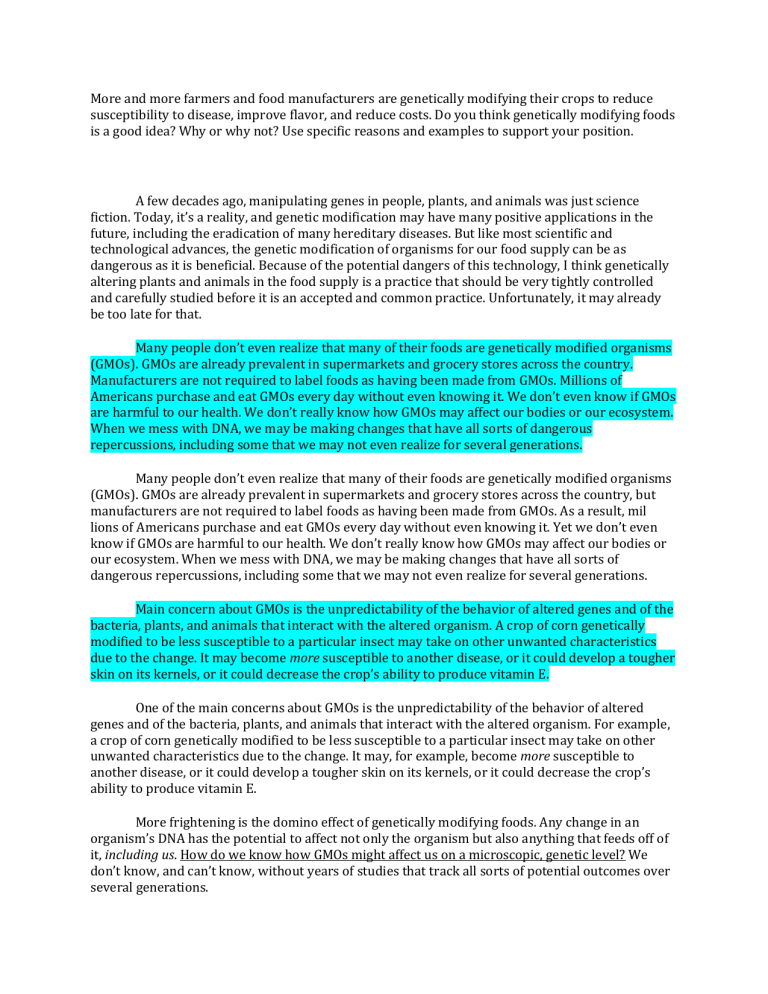
More and more farmers and food manufacturers are genetically modifying their crops to reduce susceptibility to disease, improve flavor, and reduce costs. Do you think genetically modifying foods is a good idea? Why or why not? Use specific reasons and examples to support your position. A few decades ago, manipulating genes in people, plants, and animals was just science fiction. Today, it’s a reality, and genetic modification may have many positive applications in the future, including the eradication of many hereditary diseases. But like most scientific and technological advances, the genetic modification of organisms for our food supply can be as dangerous as it is beneficial. Because of the potential dangers of this technology, I think genetically altering plants and animals in the food supply is a practice that should be very tightly controlled and carefully studied before it is an accepted and common practice. Unfortunately, it may already be too late for that. Many people don’t even realize that many of their foods are genetically modified organisms (GMOs). GMOs are already prevalent in supermarkets and grocery stores across the country. Manufacturers are not required to label foods as having been made from GMOs. Millions of Americans purchase and eat GMOs every day without even knowing it. We don’t even know if GMOs are harmful to our health. We don’t really know how GMOs may affect our bodies or our ecosystem. When we mess with DNA, we may be making changes that have all sorts of dangerous repercussions, including some that we may not even realize for several generations. Many people don’t even realize that many of their foods are genetically modified organisms (GMOs). GMOs are already prevalent in supermarkets and grocery stores across the country, but manufacturers are not required to label foods as having been made from GMOs. As a result, mil lions of Americans purchase and eat GMOs every day without even knowing it. Yet we don’t even know if GMOs are harmful to our health. We don’t really know how GMOs may affect our bodies or our ecosystem. When we mess with DNA, we may be making changes that have all sorts of dangerous repercussions, including some that we may not even realize for several generations. Main concern about GMOs is the unpredictability of the behavior of altered genes and of the bacteria, plants, and animals that interact with the altered organism. A crop of corn genetically modified to be less susceptible to a particular insect may take on other unwanted characteristics due to the change. It may become more susceptible to another disease, or it could develop a tougher skin on its kernels, or it could decrease the crop’s ability to produce vitamin E. One of the main concerns about GMOs is the unpredictability of the behavior of altered genes and of the bacteria, plants, and animals that interact with the altered organism. For example, a crop of corn genetically modified to be less susceptible to a particular insect may take on other unwanted characteristics due to the change. It may, for example, become more susceptible to another disease, or it could develop a tougher skin on its kernels, or it could decrease the crop’s ability to produce vitamin E. More frightening is the domino effect of genetically modifying foods. Any change in an organism’s DNA has the potential to affect not only the organism but also anything that feeds off of it, including us. How do we know how GMOs might affect us on a microscopic, genetic level? We don’t know, and can’t know, without years of studies that track all sorts of potential outcomes over several generations. Another fear is that transferred genes may escape from one organism into another. For example, imagine that Strain A of sweet peas was altered by adding a gene that would increase its sugar production. Through crosspollination, this altered genetic code could enter other strains and slowly (or quickly) infect the entire subspecies. If the alteration was beneficial, this could be a good thing. But the altered gene might not act the same way in all varieties, and the change may not be a good thing in the first place, and/or it may have unintended consequences. Genetically modifying foods is a practice that has been driven by the desire to make more food available more quickly and more cheaply than ever before. This attitude puts profit first and consumers and the environ ment last, and that is simply dangerous. The agribusiness needs to slow down and stop selling us GMOs until their safety is certain. Nowadays, the private life of a politician is hardly private. In your opinion, should we be so concerned with the private affairs of a politician or political candidate? State your position and support it with specific reasons and examples. When you think of former president Bill Clinton, what’s the first thing that comes to mind? Unfortunately, for many people, the first thing they think of is Monica Lewinsky. Like millions of people around the globe, I was horrified by how much the investigation delved into Mr. Clinton’s private affairs. No one needed to know the sort of details that were revealed by Ken Starr’s investigation. But while I don’t want to know the details, I do believe we have a right to know what sort of lives our politicians are living. I believe their behavior in private is a reflection of their true values and how they will behave in office. For example, if a politician lies to his or her spouse (I’m talking about big lies, like infidelity, not little white lies), that tells us something about his or her character. In my opinion, this person is not to be trusted. I wouldn’t have faith that this politician would keep his or her word. True, the relationship between a husband and wife is very different from that between a politician and his or her constituents. But the politician’s respect for that relationship and how he or she deals with any problems in that relationship reflects his or her level of integrity. Similarly, if a politician (or political candidate) behaves in an illegal manner, that shows a disrespect for the law. A government official who employs an illegal resident as a nanny or housekeeper, for example, or pays a nanny or housekeeper under the table to avoid taxes is acting as if he or she is above the law—or demonstrating that he or she simply doesn’t care about the law. This is not the kind of person I want in a public office. On the other hand, if a politician leads a respectable, lawabiding life at home, we can expect a respectable, lawabiding performance in office. A politician who deals honestly with family, friends, and business associates is likely to deal honestly with his or her constituents as well. A politician who respects the law in all aspects of his or her private life is likely to respect the law while in office, too. A candidate who behaves in a cautious, reserved manner regarding his or her personal affairs is likely to bring a similar approach to the office. I know that nobody is perfect and that every politician may have skele tons in the closet. I’m not talking about transgressions from the distant past. But I am concerned with a politician’s recent past and current behavior. Is he or she honest or does he or she break promises? Does he or she behave recklessly or in a thoughtful and controlled manner? We cannot separate who we are personally from who we are professionally. That is why I believe the public has a right to know. Today’s top professional athletes often have salaries and bonuses in the tens of millions of dollars. Do you think these athletes deserve such high compensation? Why or why not? Explain your position and use specific reasons and examples. When he was at the height of his basketball career, Michael Jordan was making approximately $300,000 per game. That’s more than most people make in a year; indeed, it’s more than some people earn in a lifetime. Yes, Michael Jordan was a phenomenal basketball player. Yes, he was also a fan tastic role model. But no, he did not deserve to earn such a ridiculously high salary. Jordan, like many other top professional athletes, was grossly over paid. Why do top athletes earn such inflated salaries? Because they bring big bucks into their cities and franchises. But what sort of service do they provide to society? Do they save lives? No. Do they improve the standard of living or promote positive social change? No. Do they help keep our streets safe or educate our kids? No. True, many of the top athletes are good role models for our children. But seven-figure salaries don’t always mean model behavior. Take N.B.A. star Latrell Spreewell, for example, who choked and threatened to kill his coach. It is true that professional athletes work hard, and many have spent their lives pursuing their goals. It is also true that most professional athletes have a relatively short career span—a decade perhaps at the top of their game. Limited as their professional sporting career may be, they don’t deserve such high salaries. After their professional sports careers are over, they can certainly pursue other careers and work “regular” jobs like the rest of us. Ending their stint as professional athletes doesn’t mean they have to stop earning incomes. They just have to earn incomes in a different way. Why should they be any different from the rest of us who may need to switch careers? It is also true that professional athletes may be injured while on the job; their work is indeed physical, and especially in contact sports like football, injuries are bound to happen. But, like the rest of us, they have insurance, and in nearly all cases, their exorbitant salaries more than cover their medical costs. And theirs is not the only high-risk job. What about miners, construction workers, or firefighters? They are at risk for physical injury every day, too—injuries that could likewise end their careers. But they sure aren’t earning millions of dollars a year. It is also true that professional athletes may spend years and years practicing with farm teams for a fraction of the salary they receive once they make it to the top. But in every career path, we start off with lower wages and must pay our dues and work our way up. Besides, farm team salaries are not always so low. We’re a sports-crazy country, a nation of fanatic sports fans and celebrity worshippers. We’re awed and entertained by the best of them—the Michael Jordans, the Alex Rodriguezes, the Emmitt Smiths. But as much as they may inspire and amuse us, professional athletes do not deserve such high salaries. Those millions could be much more wisely spent.

